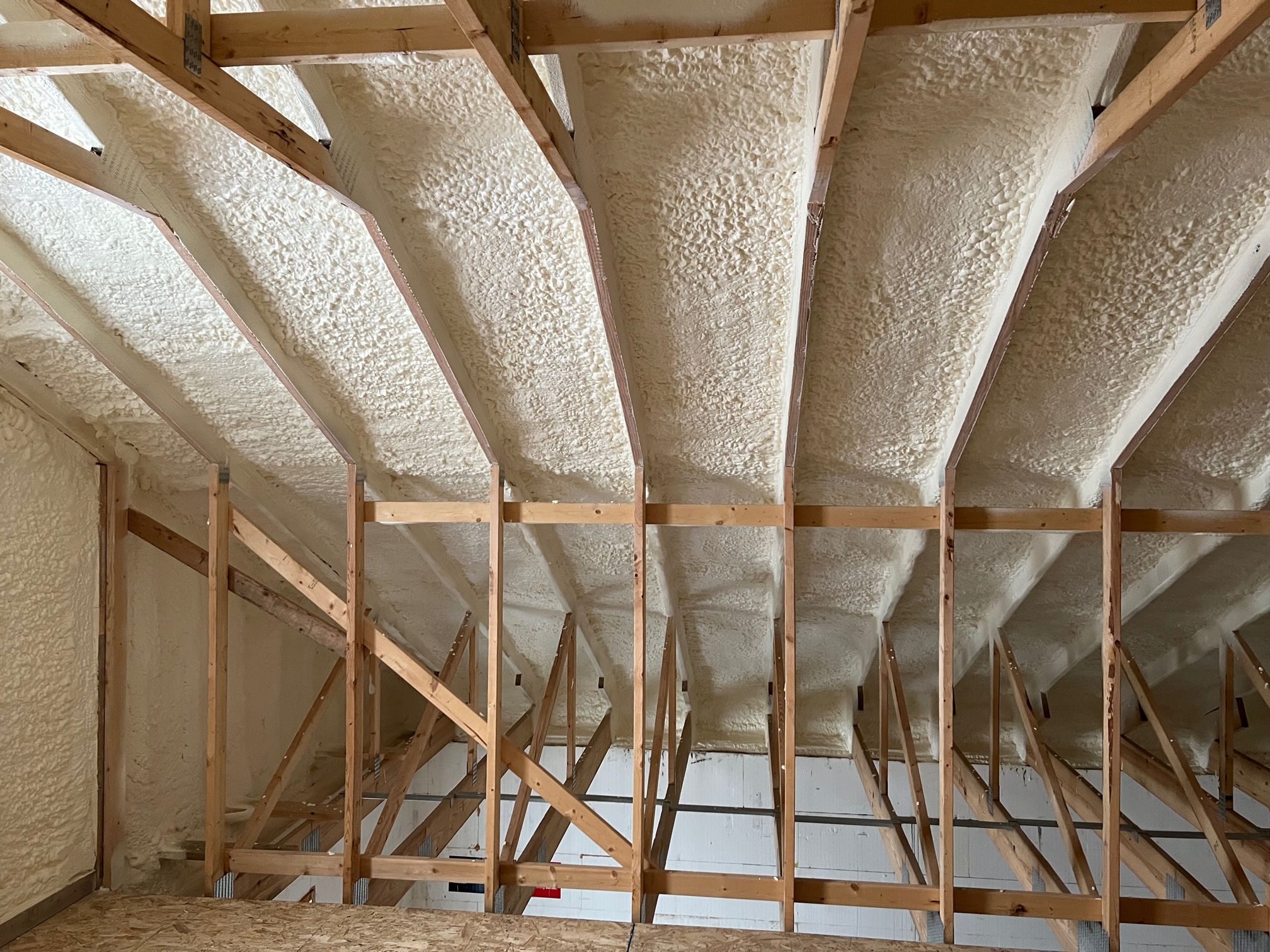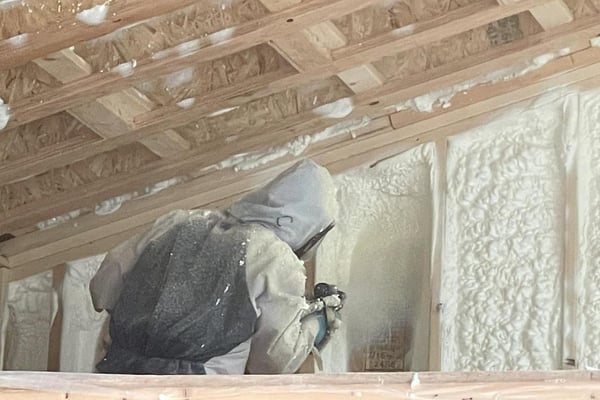Picking the Right Sort Of Spray Foam for Your Insulation Requirements
Picking the Right Sort Of Spray Foam for Your Insulation Requirements
Blog Article
Spray Foam: The Ultimate Service for Air Sealing and Insulation
Spray foam insulation has arised as a leading remedy for reliable air sealing and thermal insulation, offering a distinct mix of residential or commercial properties that establish it in addition to typical approaches. Its capability to expand and fill up voids makes it especially reliable in avoiding air leakage, which can significantly influence power effectiveness. Recognizing the full scope of its advantages, installment processes, and comparisons with various other insulation types is vital for making informed decisions. As we explore these aspects, the ramifications for both new building and constructions and retrofits become increasingly substantial. What elements should influence your option?
What Is Spray Foam?
Spray foam is a versatile insulation material that integrates the principles of air sealing and thermal resistance to boost energy effectiveness in buildings. Made up largely of polyurethane or other comparable compounds, spray foam is used as a fluid that increases upon contact with surfaces, producing a solid, continual layer of insulation. This special residential or commercial property allows it to load spaces, cracks, and voids that conventional insulation products might neglect, supplying a superior air seal.
There are two main kinds of spray foam: open-cell and closed-cell. Open-cell spray foam is lighter and extra adaptable, using outstanding audio absorption and a reduced R-value per inch - Spray Foam. In comparison, closed-cell spray foam is denser, supplying a higher R-value, dampness resistance, and included structural honesty to constructing parts
The application procedure usually includes customized tools, making sure a seamless application that sticks to various substratums, including concrete, timber, and metal. This versatility makes spray foam ideal for both new buildings and retrofitting existing structures. Its capability to develop an impermeable barrier substantially adds to decreasing energy usage and enhancing indoor air top quality, thus making it a favored choice amongst home owners and home builders alike.
Benefits of Spray Foam Insulation
Among one of the most considerable benefits of spray foam insulation is its remarkable ability to develop a continuous air barrier, which successfully lessens energy loss. Unlike traditional insulation products, spray foam expands to fill splits and spaces, ensuring that air leakage is dramatically decreased. This particular not just enhances power performance however also results in lower utility costs over time.
Furthermore, spray foam insulation provides exceptional thermal resistance, contributing to a much more secure indoor atmosphere. Its high R-value per inch enables for effective insulation in restricted areas, making it suitable for attics, walls, and crawl areas. Moreover, the moisture-resistant homes of spray foam aid stop mold and mold growth, advertising healthier living problems.
One more essential advantage of spray foam insulation is its sound-dampening top qualities (Spray Foam). It effectively reduces noise transmission in between areas, producing a quieter and more comfy home environment. The toughness of spray foam additionally stands out, as it does not droop or work out in time, preserving its efficiency throughout its life-span
How Spray Foam Works
Understanding exactly how spray foam insulation works is necessary for valuing its effectiveness in air securing and thermal resistance. Spray foam insulation is composed of two primary parts: isocyanate and polyol material. When these components are mixed, they undergo a chemical response that causes the product to expand rapidly, developing a dense foam that fills up spaces, dental caries, and fractures.
As the foam increases, it abides by surface areas, forming an impermeable seal that dramatically lowers air infiltration. This characteristic makes spray foam insulation extremely reliable at preventing drafts and wetness penetration, which can result in energy loss and damages gradually. Additionally, the closed-cell version of spray foam uses superior thermal resistance due to its inflexible framework, properly minimizing heat transfer.
The special properties of spray foam enable it to conform to irregular surface areas, making sure thorough coverage and a seamless obstacle. As an outcome, spray foam insulation not just enhances power efficiency yet also adds to improved interior air top quality by decreasing the accumulation of contaminants and allergens. Ultimately, recognizing the auto mechanics behind spray foam highlights its function as a remarkable selection for insulation and air sealing in both domestic and industrial applications.
Installment Process Summary

Before installation, the area needs to be properly cleansed and prepped, guaranteeing that surface areas are without dust, particles, and dampness. This action is crucial since contaminants can compromise adhesion and total efficiency. Once the area is prepared, the application includes mixing both components of the spray foam, which increases upon call and loads spaces effectively.
Educated professionals ought to conduct the installment, using specialized devices to make sure consistent insurance coverage and optimum density. Security preventative measures, including wearing protective equipment and guaranteeing appropriate air flow, are imperative during this process. After application, the foam generally cures rapidly, forming a strong barrier that enhances energy efficiency.
Contrasting Spray Foam to Standard Insulation
When evaluating insulation choices, spray foam insulation attracts attention in comparison to conventional products such as fiberglass and cellulose. One of the main benefits of spray foam is its exceptional air securing abilities. Unlike fiberglass and cellulose, which can permit air seepage, spray foam increases upon application, filling holes and spaces to produce an impermeable seal. This results in boosted power effectiveness, as less heated or cooled down air escapes the home, bring about reduced utility expenses.
In addition, spray foam provides a higher R-value per inch than typical insulation kinds, offering more effective thermal resistance in a thinner this contact form profile. This particular is specifically beneficial precede with restricted cavity depth. Spray foam is immune to dampness and mold development, which can be a considerable concern with cellulose and fiberglass, specifically in damp environments.
Nevertheless, spray foam insulation commonly brings a greater upfront cost than its typical equivalents. Home owners should weigh this preliminary financial investment versus long-term energy financial savings and performance advantages. Ultimately, while both insulation types offer their purpose, spray foam arises as a more sophisticated remedy for contemporary insulation demands, specifically in terms of air sealing and thermal effectiveness.

Verdict
In summary, spray foam insulation stands for an extremely reliable option for attaining optimal air sealing and thermal resistance. Its one-of-a-kind homes, including wetness resistance and noise dampening, make it suitable for numerous applications in both brand-new buildings and retrofitting projects (Spray Foam). Although the preliminary prices may be higher contrasted to conventional insulation products, the long-term benefits, such as substantial energy savings and enhanced indoor air top quality, justify the financial investment and underscore its value in contemporary structure practices.
Spray foam insulation has arised as a leading remedy for efficient air sealing and thermal insulation, using an one-of-a-kind mix of properties that establish it apart from standard techniques.Spray foam is a functional insulation material that integrates the principles of air sealing and thermal resistance to enhance energy effectiveness in buildings.When reviewing insulation alternatives, spray foam insulation stands out in comparison to standard products such as fiberglass and cellulose. Eventually, while both insulation kinds serve their purpose, spray foam arises as a much more innovative option for contemporary insulation needs, specifically in terms of air securing and thermal performance.
In summary, here are the findings spray foam insulation stands for a highly efficient remedy for attaining optimum air sealing and thermal resistance.
Report this page